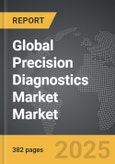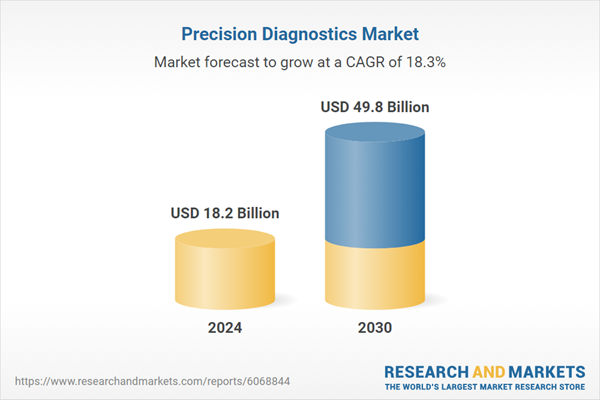Global Precision Diagnostics Market - Key Trends & Drivers Summarized
Why Is Precision Diagnostics Reshaping the Future of Healthcare?
Precision diagnostics refers to a set of advanced medical technologies that enable highly accurate disease detection, often at the molecular or genetic level. Unlike traditional diagnostic methods, precision diagnostics focuses on individual variability in genes, lifestyle, and environment to tailor diagnosis and treatment strategies to each patient. This shift allows for earlier disease identification, better risk stratification, and more personalized care pathways, significantly improving patient outcomes and reducing treatment inefficiencies.The increasing global incidence of complex diseases such as cancer, cardiovascular conditions, and autoimmune disorders has accelerated the demand for more sophisticated diagnostic tools. As healthcare systems evolve toward prevention and value-based care, precision diagnostics is emerging as a cornerstone of this transformation. Its role in early detection, prognosis, and monitoring is not only reducing disease burden but also enabling timely intervention, which is especially critical for chronic and life-threatening conditions.
How Are Technological Advancements and Consumer Expectations Influencing the Market?
Technological innovation is rapidly advancing the precision diagnostics landscape. The growing capabilities of genomic sequencing, molecular profiling, and biomarker analysis have made it possible to detect diseases at their earliest and most treatable stages. Tools powered by artificial intelligence and machine learning are now enhancing pattern recognition, automating data interpretation, and supporting real-time clinical decision-making. These breakthroughs are expanding the scope and speed of diagnostics, making them more effective and scalable.At the same time, consumer behavior is shaping how precision diagnostics are being designed and delivered. Today's patients are more health-literate, data-conscious, and proactive about personalized health solutions. There's growing interest in non-invasive testing options such as liquid biopsies, wearable health devices, and home-based test kits. This shift is pushing healthcare providers and diagnostics companies to deliver more user-centric experiences that combine accuracy, speed, convenience, and privacy. These evolving expectations are influencing product development, clinical workflows, and the overall positioning of precision diagnostics in modern medicine.
The Growth in the Precision Diagnostics Market Is Driven by Several Factors……
The growth in the precision diagnostics market is driven by several factors, starting with the expanding application of diagnostic technologies across oncology, cardiology, neurology, and infectious diseases. The ability to identify actionable genetic mutations and biomarkers is enabling clinicians to tailor therapies and monitor treatment effectiveness with greater precision. This is particularly crucial in cancer treatment, where targeted therapies are becoming standard practice.Another major driver is the reduction in cost and complexity of advanced diagnostic technologies, making them more accessible to clinics, labs, and even consumers. The integration of diagnostics with electronic health records, clinical decision support tools, and personalized treatment algorithms is enhancing care coordination and reducing misdiagnoses. Additionally, rising investment in health innovation and institutional support for personalized medicine is fostering the development and deployment of next-generation diagnostic platforms. Collectively, these factors are positioning precision diagnostics as a transformative force in the future of healthcare.
Report Scope
The report analyzes the Precision Diagnostics market, presented in terms of market value (US$). The analysis covers the key segments and geographic regions outlined below:- Segments: Test Type (Genetic Tests, Direct to Consumer Tests, Esoteric Tests, Other Test Types); Application (Oncology Application, Respiratory Diseases Application, Skin Diseases Application, CNS Disorders Application, Immunology Application, Genetic Diseases Application, Other Applications); End-Use (Clinical Laboratories End-Use, Hospitals End-Use, Other End-Uses).
- Geographic Regions/Countries: World; United States; Canada; Japan; China; Europe (France; Germany; Italy; United Kingdom; Spain; Russia; and Rest of Europe); Asia-Pacific (Australia; India; South Korea; and Rest of Asia-Pacific); Latin America (Argentina; Brazil; Mexico; and Rest of Latin America); Middle East (Iran; Israel; Saudi Arabia; United Arab Emirates; and Rest of Middle East); and Africa.
Key Insights:
- Market Growth: Understand the significant growth trajectory of the Genetic Tests segment, which is expected to reach US$26.3 Billion by 2030 with a CAGR of a 20.1%. The Direct to Consumer Tests segment is also set to grow at 14.9% CAGR over the analysis period.
- Regional Analysis: Gain insights into the U.S. market, valued at $5 Billion in 2024, and China, forecasted to grow at an impressive 24.3% CAGR to reach $11.3 Billion by 2030. Discover growth trends in other key regions, including Japan, Canada, Germany, and the Asia-Pacific.
Why You Should Buy This Report:
- Detailed Market Analysis: Access a thorough analysis of the Global Precision Diagnostics Market, covering all major geographic regions and market segments.
- Competitive Insights: Get an overview of the competitive landscape, including the market presence of major players across different geographies.
- Future Trends and Drivers: Understand the key trends and drivers shaping the future of the Global Precision Diagnostics Market.
- Actionable Insights: Benefit from actionable insights that can help you identify new revenue opportunities and make strategic business decisions.
Key Questions Answered:
- How is the Global Precision Diagnostics Market expected to evolve by 2030?
- What are the main drivers and restraints affecting the market?
- Which market segments will grow the most over the forecast period?
- How will market shares for different regions and segments change by 2030?
- Who are the leading players in the market, and what are their prospects?
Report Features:
- Comprehensive Market Data: Independent analysis of annual sales and market forecasts in US$ Million from 2024 to 2030.
- In-Depth Regional Analysis: Detailed insights into key markets, including the U.S., China, Japan, Canada, Europe, Asia-Pacific, Latin America, Middle East, and Africa.
- Complimentary Updates: Receive free report updates for one year to keep you informed of the latest market developments.
Some of the 34 companies featured in this Precision Diagnostics market report include:
- Abbott Laboratories
- Agilent Technologies Inc.
- Bayer AG
- Becton, Dickinson and Company
- bioMérieux SA
- Danaher Corporation
- Exact Sciences Corporation
- F. Hoffmann-La Roche Ltd
- Guardant Health
- Hologic, Inc.
- Illumina, Inc.
- Koninklijke Philips N.V.
- Lantheus Holdings, Inc.
- Myriad Genetics, Inc.
- Novartis AG
- PerkinElmer, Inc.
- QIAGEN N.V.
- Siemens Healthineers AG
- Swiss Precision Diagnostics GmbH
- Thermo Fisher Scientific Inc.
This edition integrates the latest global trade and economic shifts into comprehensive market analysis. Key updates include:
- Tariff and Trade Impact: Insights into global tariff negotiations across 180+ countries, with analysis of supply chain turbulence, sourcing disruptions, and geographic realignment. Special focus on 2025 as a pivotal year for trade tensions, including updated perspectives on the Trump-era tariffs.
- Adjusted Forecasts and Analytics: Revised global and regional market forecasts through 2030, incorporating tariff effects, economic uncertainty, and structural changes in globalization. Includes historical analysis from 2015 to 2023.
- Strategic Market Dynamics: Evaluation of revised market prospects, regional outlooks, and key economic indicators such as population and urbanization trends.
- Innovation & Technology Trends: Latest developments in product and process innovation, emerging technologies, and key industry drivers shaping the competitive landscape.
- Competitive Intelligence: Updated global market share estimates for 2025, competitive positioning of major players (Strong/Active/Niche/Trivial), and refined focus on leading global brands and core players.
- Expert Insight & Commentary: Strategic analysis from economists, trade experts, and domain specialists to contextualize market shifts and identify emerging opportunities.
Table of Contents
Companies Mentioned (Partial List)
A selection of companies mentioned in this report includes, but is not limited to:
- Abbott Laboratories
- Agilent Technologies Inc.
- Bayer AG
- Becton, Dickinson and Company
- bioMérieux SA
- Danaher Corporation
- Exact Sciences Corporation
- F. Hoffmann-La Roche Ltd
- Guardant Health
- Hologic, Inc.
- Illumina, Inc.
- Koninklijke Philips N.V.
- Lantheus Holdings, Inc.
- Myriad Genetics, Inc.
- Novartis AG
- PerkinElmer, Inc.
- QIAGEN N.V.
- Siemens Healthineers AG
- Swiss Precision Diagnostics GmbH
- Thermo Fisher Scientific Inc.
Table Information
| Report Attribute | Details |
|---|---|
| No. of Pages | 382 |
| Published | February 2026 |
| Forecast Period | 2024 - 2030 |
| Estimated Market Value ( USD | $ 18.2 Billion |
| Forecasted Market Value ( USD | $ 49.8 Billion |
| Compound Annual Growth Rate | 18.3% |
| Regions Covered | Global |









